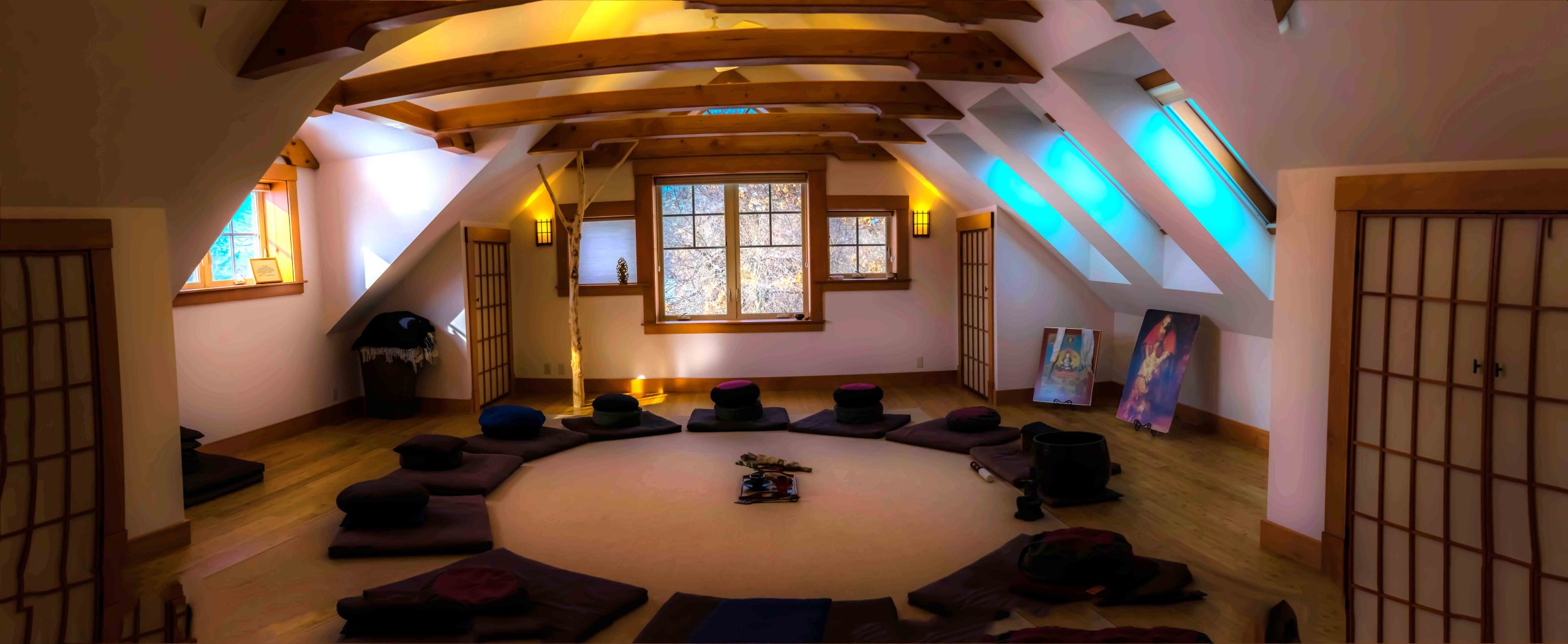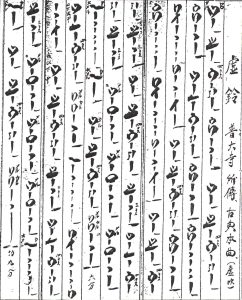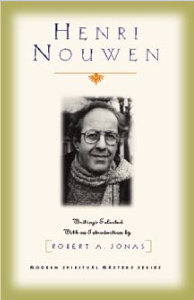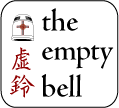
Dr. Jonas writes,
The inspiration for The Empty Bell came to me in prayer in the late 1980’s. Having finished my doctorate in psychology and education at Harvard, I practiced as a psychotherapist in Reading and in Cambridge, MA. Each morning in my home office I sat in silent meditation and prayer before my clients arrived. One morning my imagination was charged with a radiant image: I saw a circle of leaders from many different spiritual traditions sitting on cushions in a circle. The affection between them seemed palpable as they sat in silence and then listened to one another share stories of their families, communities, and commitments. I felt blessed and inspired by the vision of friendship across such diverse spiritual communities, and I felt that the vision had something to do with me and my future. I was reminded of the Pentecost story in the book of Acts (2:1-8),
When the day of Pentecost had come, they were all together in one place. And suddenly from heaven there came a sound like the rush of a violent wind, and it filled the entire house where they were sitting. Divided tongues, as of fire, appeared among them, and a tongue rested on each of them. All of them were filled with the Holy Spirit and began to speak in other languages, as the Spirit gave them ability. Now there were devout Jews from every nation under heaven living in Jerusalem. And at this sound the crowd gathered and was bewildered, because each one heard them speaking in the native language of each. Amazed and astonished, they asked, “Are not all these who are speaking Galileans? And how is it that we hear, each of us, in our own native language?
At the time, some said that this revelation of mutual understanding arose because everyone was drunk. But Jesus’ friend, Peter said no. What you see here is the fulfillment of the prophet Joel’s prediction, that in hard times of bitter dispute, God will pour out the Spirit and inspire people who are ordinarily opposed to one another, find common ground and peace. I wondered if this ancient story could still be relevant. I decided that I needed more education in the Christian contemplative tradition, so with the support of my friend and mentor, Fr. Henri Nouwen, I enrolled as a post-doc Master’s student at Weston Jesuit School of Theology in Cambridge. At Weston I took courses in Hebrew and Christian Scripture, theology, Christology, and the history of mysticism. This training, along with several years of receiving spiritual direction both in the Zen Buddhist and Christian traditions, inspired me to integrate spiritual and psychological work with my clients.
After graduating from Weston in 1992 our extended family bought and refurbished a house in Watertown, MA. On the property stood an old carriage house that I renovated in the style of a Japanese zendo. Around the sides of the room I set a few chairs, and in the middle I placed a circle of twelve cushions. I hung a few Christian and Buddhist icons on the walls.

Japanese shakuhachi notation for Kyo Rei (Empty Bell)
I decided to name the sacred space and our particular mission “The Empty Bell” after an old musical piece called Kyo Rei from the Sui-Zen (Blowing Zen) tradition that I was beginning to learn. The Empty Bell began as a professional office with a spiritual ambiance. In addition to working one-on-one with clients in psychotherapy, I also offered workshops and retreats and invited other teachers to speak who were interested in the healing interaction of psychotherapy, Buddhist meditation and Christian contemplative prayer.
In the Empty Bell’s first three years I offered many half-day retreats on themes associated with the Christian liturgical year–Advent, Christmas, Epiphany, Lent, Holy Saturday, Easter, and Pentecost. Sometimes I invited co-leaders from non-Christian traditions, often Zen masters or Tibetan lamas, to join me in addressing such topics as “Emptiness: Buddhist and Christian,” “The Birth of Christ in John’s Gospel,” “Evagrius of Ponticus on Christian Meditation,” “Early Christian Classics,” “Exploring St. Paul’s ‘Mind of Christ’,” “Psychotherapeutic Healing: A Buddhist/Christian Dialogue,” and “Christ and the Healing Tao.”
These special educational retreats were often well-attended. Soon, a core group of people emerged who wanted to pursue some of these topics in greater depth. We developed a Tuesday evening course on the Christian mystics that met for eight weeks in the fall and also in the spring. Over the three years of this course we drew on the Paulist Press series, “Classics of Western Spirituality.” Before each meeting, individuals in the group of ten prepared by reading certain Christian spiritual masters from the 4th to the 16th centuries (e.g., Evagrius, Cassian, Symeon the New Theologian, the author of The Cloud of Unknowing, St. Hildegard of Bingen, Julian of Norwich, and St. Teresa of Avila). During the week each of us prayed with the readings, looking for those places where we felt most deeply touched by a story, metaphor, or spiritual insight. When we gathered, we began with twenty minutes of silence, and then shared with the group our prayerful response to the reading. I still thought of myself primarily as the teacher of a class, but as we prayed, meditated, and shared our journeys with each other, I became uncomfortable with the idea that I knew the best universal method for spiritual and psychological wholeness. I did not want to create a false separation between myself and others. I enjoyed teaching others, but on a personal level, I realized that I needed to be part of a community where wisdom could emerge and be shared from each participant. I gradually became apparent that the Holy Spirit was re-forming us into a Christian community. I would remain the host, to set the basic direction of learning and sharing, but I would not require everyone to learn a particular method of psychological or spiritual awakening. We could learn from the wisdom in many world religions, and from many different psychological traditions. Still, for me, the Christian mystical and contemplative tradition would be our north star. This overall spiritual direction helped me to discern whether participants were psychologically healthy enough for a demanding contemplative practice.
One series of community retreats stands out from this period of The Empty Bell’s history. I knew that the Gospel of John was controversial for its Gnostic tendencies and its apparent anti-Semitism. Yet I also felt drawn to John as the most mystical of all the Gospels. So we decided to take up the challenge of discerning where John could help us. In the mid-1990’s I led a small group that focused on the Gospel of John as a text of transformation. Over the weeks and months of our evening gatherings, we read John together prayerfully, chapter by chapter. Convinced that our Christian tradition had over-emphasized morality, belief and outward behavior while essentially ignoring Christ’s astounding teachings on consciousness, awareness and transformation, I presented John’s Gospel as a roadmap for personal transformation. What does it mean, in our experience, to be “transformed” in Christ? What patterns of thought and emotion seem to block us from this transformation? I asked each participant, including myself, to pray with these questions throughout the eight-week semester.
 Together we discovered that some of the most common barriers to transformation are the self-limiting beliefs we have about ourselves, beliefs that make us smaller and less joyful and creative than we really are. As someone with psychotherapeutic training, I knew that most of these barriers to wholeness were established in childhood, and that very often, we don’t know how to access the critical memories buried in the unconscious. I was fortunate to have met Fr. Henri Nouwen when was teaching at the Harvard Divinity School, and he had become my friend and mentor. Henri was a Dutch citizen who had come to America in the 1960’s to study at the Menninger Psychiatric Clinic in Kansas. This began his life-long exploration of the spiritual/psychological journey, one that would become my life work at the Empty Bell. Henri had often spoken about the small identities that entrap us, so that we believe that essentially we are what others think about us, what we own, what we do, and what we’ve accomplished. In Henri’s view, our deepest identity is the Beloved of God, but, as he recognized, claiming our deep identity or True Self can be difficult and requires commitment and discipline. It’s difficult because we become addicted to our public personas, and the self-images we want to construct. And difficult because our surrounding capitalist society requires us to project a particular identity to make a living. Henri’s vision was profoundly counter-cultural. But this is the discipline that I hoped the Empty Bell could nourish and share.
Together we discovered that some of the most common barriers to transformation are the self-limiting beliefs we have about ourselves, beliefs that make us smaller and less joyful and creative than we really are. As someone with psychotherapeutic training, I knew that most of these barriers to wholeness were established in childhood, and that very often, we don’t know how to access the critical memories buried in the unconscious. I was fortunate to have met Fr. Henri Nouwen when was teaching at the Harvard Divinity School, and he had become my friend and mentor. Henri was a Dutch citizen who had come to America in the 1960’s to study at the Menninger Psychiatric Clinic in Kansas. This began his life-long exploration of the spiritual/psychological journey, one that would become my life work at the Empty Bell. Henri had often spoken about the small identities that entrap us, so that we believe that essentially we are what others think about us, what we own, what we do, and what we’ve accomplished. In Henri’s view, our deepest identity is the Beloved of God, but, as he recognized, claiming our deep identity or True Self can be difficult and requires commitment and discipline. It’s difficult because we become addicted to our public personas, and the self-images we want to construct. And difficult because our surrounding capitalist society requires us to project a particular identity to make a living. Henri’s vision was profoundly counter-cultural. But this is the discipline that I hoped the Empty Bell could nourish and share.
My hope is that the Empty Bell course on the Gospel of John supported Henri’s transformational vision. By the end of our year together most participants agreed that we had experienced the potential of a small Christian community to empower its membership to discover that the Good News is something real for each person – that it is news that makes a difference. Standing in the midst of St. John’s vision, we listened with genuine car to one another, confident that each person could step even further into the reality of being God’s beloved. By the end of our series, most participants had taken practical steps to make necessary changes in their relationships and even their jobs.
In all these workshops and retreats I felt that my leadership style was changing. Perhaps because several participants returned for many workshops, I began increasingly to trust and to rely on the wisdom of the participants and the presence of the Holy Spirit in our midst. As we prayed together and shared our stories of divine encounter (or abandonment), I began to see that while I might have some valuable theological knowledge and psychological insights to offer, the real teacher was the Holy Spirit within, and among us. Gradually I realized that I needed these gatherings as much as the participants did. The professional model of the Empty Bell as an educational setting was changing into a model of the Empty Bell as Christian community.
At the start of each Fall and Winter I’d invite ordained Buddhist and Christian teachers to give talks, and I’d prepare a three month schedule. After three years I watched the mailing list grow to over five hundred people. But I also noticed that most participants in our programs came from a pool of about forty people. A sense of community was developing among us, the reality of which was nourished most dramatically in the fall of 1995 when Fr. Henri Nouwen lived with our family for the first three months of his sabbatical year. During that fall, Henri would often come to the Empty Bell to offer a contemplative Eucharist or to lead a discussion about spiritual practices.
I had known Henri since 1982 when, as a Harvard graduate student, I attended a lecture that he gave at the St. Paul’s Church in Harvard Square. He was wildly popular at Harvard, but not so popular among his fellow theologians. Some of us thought that Harvard wasn’t a good fit for Henri because he was really a pastor and not an academic theologian. He had taught at Notre Dame and Yale, but after his experience at Harvard he discerned a different call. In 1985 Henri left Harvard to pursue a life in the international community of handicapped people called L’Arche. Throughout the later 80’s and early 90’s he asked me to accompany him and other L’Arche members as they gave retreats, so for several years I had contributed occasional talks on contemplative topics. After I completed my work with the Jesuits at Weston, where I had picked up the Blowing Zen practice of the shakuhachi flute, I would sometimes come to Henri’s presentations and play the flute to introduce some moments of meditation and prayer.
In 1995, when Henri lived with our family, he settled in to hide for a while from his admiring fans and to write. During his three-month visit he drafted three books–The Inner Voice of Love, Can You Drink The Cup? and Bread for the Journey. In his Eucharistic gatherings as pastor for the L’Arche Daybreak community in Richmond Hill, Ontario, Henri had always used the small, monthly booklet of daily readings called Living With Christ. Over the months of Henri’s presence with us, members of The Empty Bell liked and grew accustomed to reading this booklet. After Henri left, we subscribed to Living With Christ and incorporated it into our ongoing Thursday and Sunday gatherings. Sitting in a circle on cushions or chairs, each person would read from the Hebrew and Christian scriptures assigned for the day in the Roman Catholic tradition. We soon learned that these readings were often the same as in the Episcopal tradition where my wife, Rev. Dr. Margaret Bullitt-Jonas, was a priest.
Through Henri’s homilies, our community absorbed his emphasis that each of us, like Jesus, is the beloved son or daughter of God – eternally beloved since even before we were born. Henri’s spirit and vision continued to inspire our community after his sudden death from a heart attack on September 21, 1996. Soon after his death, National Public Radio asked me to announce Henri’s passing on national radio, at: https://n.pr/3hQHxlu In 2000 I was asked to serve on the Henri Nouwen Society Board, a service that I enjoyed for several years (www.henrinouwen.org).
In the early years of the Empty Bell, I led all gatherings. But after a couple of years, when other commitments took me away, different community members stepped forward to lead. For awhile, Susan, who had come to Empty Bell offerings from the beginning, led every other Thursday. As our sense of community and mutual trust deepened, I felt comfortable handing over Sunday leadership to a few others–Caitlin, Kevin, Jody, Donna, David, Richard, Sam, Jeannie, Lisa and Joe. For years, the leadership at Thursday morning sessions was rotated among a group of four, and Sunday leadership was shared among a group of eight. After a while, I was happy to participate while others led.
To support this evolution in leadership we created a leaders’ group meeting of eight people. Fortunately, by chance, this group included equal numbers of men and women. The leaders met quarterly to discuss questions and issues such as difficult dynamics in group participation, when and how to respond to members in great distress, how to handle intense feelings that arose while leading, how to interpret difficult scripture passages, how much contact to make with other group members outside our official gatherings, what to do when the sharing time became too “heady,” whether and when to say something during the silent meditations, and so on. The leaders’ group also helped me to coordinate volunteers for special Empty Bell interfaith events and for large quarterly retreats.
In 1997 I retired as a psychotherapist and instead devoted one-half of each workday to offering spiritual direction. By the beginning of 2000, The Empty Bell had become home to three other spiritual directors who met one-on-one with directees. The four of us began meeting as a peer supervision and support group. Through all these changes I realized more and more that the Empty Bell community possessed resources of knowledge, wisdom, and healing presence that transcended me and my personal vision and resources. I realized that I needed the prayerful support of my Empty Bell friends, and that we were now co-creators of a very special contemplative experiment in community.
In 1997 one of our members, a lawyer, offered to help the Empty Bell become a non-profit, tax-exempt organization. With Jim’s astute legal counsel and friendship, that goal was achieved later that year. Four people in the community volunteered to serve on our first official Board, and in subsequent years we worked together to make the Christian contemplative vision available to more people. Our vision was ambitious: we dreamed of starting a vibrant training program for contemplative spiritual directors and of developing a retreat program that would introduce the contemplative path to more and more Christian congregations, both Protestant and Catholic.
In my last seminar at Weston Jesuit School of Theology I had met David Duncavage, a former Trappist monk, and now a Teaching Fellow at Weston. David introduced me to the Japanese bamboo flute, the shakuhachi. He had left the Trappists in the early 1980’s in order to live in Japan and to learn the Blowing-Zen tradition. By the time he came to Weston as a teaching assistant he had become a shakuhachi master and a maker of shakuhachis. In 1991, during a Jesuit seminar on Thomas Merton’s relationship with the Dalai Lama, I heard David play the instrument and knew immediately that this would be my instrument, and I began intensive lessons with David. Over the years I gradually incorporated Sui-Zen into my Christian prayer life, and eventually I played the shakuhachi at every event I led, sometimes offering contemplative concerts as a musician rather than as a retreat leader. From the mid-1990’s to roughly 2015, the Empty Bell has hosted many shakuhachi teachers and students, such as Riley Lee and especially David’s main teacher, Yodo Kurahashi from Kyoto.
In many ways, our Empty Bell community was thriving in the late 1990’s. In addition to offering regular meditation sittings and study groups, we hosted several church leadership and teen groups. The Empty Bell had become a Sui-Zen zendo (sacred teaching space) and was well-known in the Boston area as a center of contemplative learning and Buddhist-Christian dialogue.
In the first few years of the new Millennium, about fifteen people regularly attended one or another of the Empty Bell gatherings. We thought of ourselves as a small, intimate community of Christian contemplatives seeking to deepen our own lives in the Spirit and to bring that spiritual grounding to our work as teachers, lawyers, psychologists, pastors, editors, social workers, administrators and artists. By now, my ministry included trips to many churches and retreat centers to lead contemplative retreats and to give sermons.
However, as a community we were also going through a period of struggle and discernment. By the time my family and I moved to western Massachusetts in 2004, it was clear that The Empty Bell had not achieved the larger mission and vision that we had once hoped for. During its last four years in Watertown, the Empty Bell suspended its public gatherings. Several contemplative groups continued to meet at The Empty Bell, but their membership was by invitation only. The Empty Bell leadership sensed that we needed a time to slow down and to listen to the Spirit, both individually and as a community.
During this time of reflection on our mission, I and the other co-leaders met several times to discuss our hopes and differences regarding The Empty Bell’s leadership and mission. Some of these discussions were tense and difficult, but I think we did a pretty good job of telling our truths in love and of trusting in the guidance of the Spirit. One of the most difficult conversations concerned our mission statement, which affirmed that The Empty Bell was primarily a Christian contemplative center. Some of us felt that The Empty Bell should also teach other spiritual paths or offer liturgies that borrowed readings and practices from non-Christian sources, much as a Unitarian Universalist congregation might do. As a result of these meetings some of our leaders decided to leave. Those of us who remained resolved to continue on the Christian way as our primary commitment. We also agreed to reach out beyond the Buddhist and Christian traditions, to seek wisdom wherever we could find it.
In 2005 our family decided that we need to get out of the Boston area. We tired of the speedy, crowded city life, and moved to Northampton, Mass., in the foothills of the Berkshires. In our renovated Victorian home we built a new sanctuary for prayer and meditation. The new Empty Bell looked very much like the original one. Its peaceful atmosphere recalling that of a Japanese zendo. The room features a circle of cushions on a bamboo floor, a variety of Christian and Buddhist icons, and large windows that let in plenty of sky and light.
In 2023 we continue to incubate a new vision for The Empty Bell community in the Pioneer Valley, and the world. The mission of the new Empty Bell in Northampton remains: to offer a physical and online space for Christians to explore the contemplative journey, and to cultivate Buddhist-Christian events. We have also become interested in the more inclusive spiritual vision known as The Perennial Tradition, as explored by people like Aldous Huxley and Evelyn Underhill. Occasionally, graduate students from Harvard and Smith College will come in person to the Empty Bell, to practice contemplation, and to share what we’re learning about ourselves and our world. However, since the COVID 19 pandemic struck in 2020, most Empty Bell events happen on Zoom, or as a participant in webinars.
I am eager to share the vision of The Empty Bell, to introduce people to the riches of contemplative prayer, and to explore the ways that prayerful listening and speaking can re-vitalize interfaith dialogue and deepen Christian community, and really, all communities. I embody this commitment by traveling to congregations and retreat centers, by offering sermons, lectures and retreats, by playing the shakuhachi, and by continuing to publish writings about the contemplative vision and the importance of the Buddhist-Christian dialogue. I have published two books about Henri Nouwen–one from the Roman Catholic Maryknoll publisher (Orbis Books), and one from the Buddhist publisher, Shambhala. Where possible, these writings—especially my most recent book, My Dear Far-Nearness–are shared here at the Empty Bell’s websites, emptybell.org and also at mydearfar-nearness.org.
© Robert A. Jonas, 2006 & 2023 (reprint by written permission only)

Church Of Good Shepherd, Lake Tekapo, Mackenzie, New Zealand, iStock-483929690.jpg
